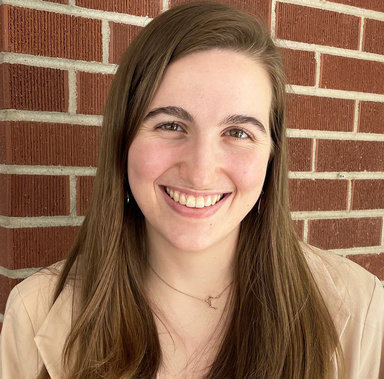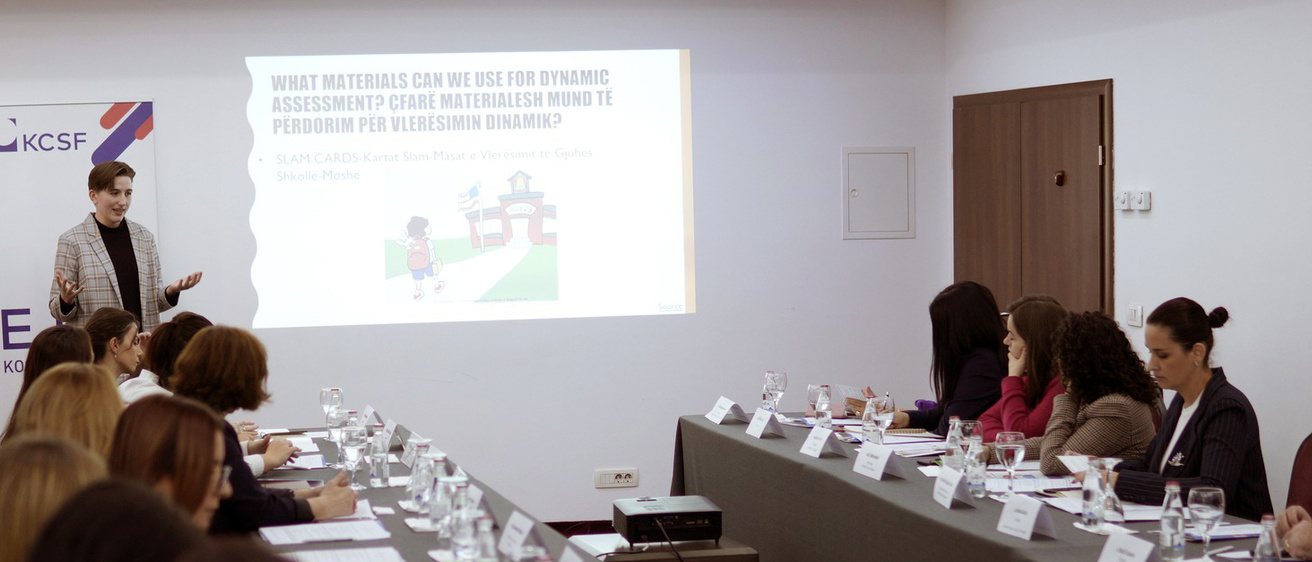When Charlotte Hilker received a Fulbright Grant to Kosovo soon after earning a master’s degree at Iowa, she knew she could be a skilled speech-language pathologist. Now she’s flourishing as a changemaker.
Story: Julie Ostrem

It’s not atypical for a speech-language pathologist to strongly advocate for clients. After all, the profession tends to attract those who genuinely wish to make people’s lives better.
Charlotte Hilker (MA 2023), however, is extending her activism far beyond clinic walls with current efforts to improve speech therapy services within the small, eastern European nation of Kosovo.
“Most children here never have access to a speech therapist, which can take a toll on their well-being and educational outcomes,” she said. “Speech therapy is not publicly available in Kosovo like it is in the U.S.”
Since September, Hilker has been collaborating with the staff at The Kosovo Institute of Speech Therapy (Instituti Kosovar për Logopedi) to increase services to improve the lives of those with communication disorders. She produced a video and launched a fundraising campaign to support the institute's work with children.
“This organization provides crucial free therapy services to kids in need," Hilker said. "But it also improves accessibility -- putting up picture communication boards in schools and on public playgrounds for children who don’t communicate verbally. The institute also hosts educational events for speech therapists in Kosovo to improve their practice.”
Hilker broadened her work to include a research project, partnering with Philip Combiths, PhD, CSD Assistant Professor and Director of Iowa’s Clinical Linguistics and Disparities Lab. They seek to better understand unique school-age language norms in this small nation, roughly the same size as Connecticut.
When Hilker, a Des Moines, IA, native, made the decision to serve abroad, she knew she would need an understanding of the history and culture of this tiny nation to make impactful and long-lasting changes.
“The Serbian occupation in the 1990s created barriers to education for ethnic Albanians, leading to illiteracy or low literacy in Kosovo, especially for women," she explained. "That has had downstream effects for Kosovo’s children today, and for their educational outcomes.”
Although Kosovo gained independence in 2008, some nations do not recognize the country due to geopolitical tensions in the Balkan region, she added. This makes it difficult to attain financial support for social service providers such as The Kosovo Institute of Speech Therapy.
Insights into Kosovo’s history and culture -- along with Albanian language courses -- are valuable pieces of knowledge. But Hilker says she leans just as heavily on the skillset she built during her master’s degree program at Iowa.
“Iowa’s CSD program teaches you to reframe issues and find creative solutions to any problem you may face. Those skills have been crucial during my Fulbright year,” she explains.
Coursework in CSD at Iowa includes discussions about collaborating with immigrant and refugee families and working with non-English or multi-language speakers. Professors urge CSD students to think broadly; for example, students should not assume that all cultures, communities and countries prioritize book-reading as American parents tend to do.
Happily, the mentoring at Iowa didn’t stop at graduation, she says.
“When I first got to Prishtina, (Kosovo’s capital and sister city to Des Moines), I quickly realized how new this all was and that I may not have every answer, so I reached out for help,” she said.
“I’m so grateful for the Zoom conversations with for my former mentors Philip Combiths and Clinical Professor Anu Subramanian,” she said. “They helped me think through what differences I can make and how to make lasting and meaningful change.”
